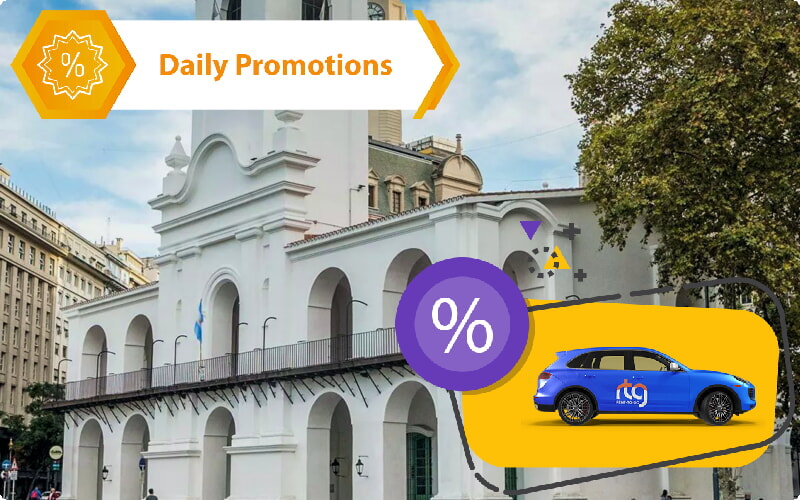 Up to
-35%
Up to
-35%
Buenos Aires, the vibrant capital of Argentina, is a city that offers a unique blend of European charm and Latin American flair. If you're planning to explore this bustling metropolis and its surrounding areas, hiring a car can be a convenient and flexible option. Here’s everything you need to know about car hire in Buenos Aires.
While Buenos Aires has an extensive public transportation system, hiring a car provides the freedom to explore at your own pace. Whether you want to visit the picturesque Tigre Delta, the historic town of San Antonio de Areco, or the scenic Pampas, a car gives you the flexibility to venture beyond the city limits.
To hire a car in Buenos Aires, you will need:
Several international and local car rental companies operate in Buenos Aires, including Hertz, Avis, and Localiza. It’s advisable to compare prices and read reviews before making a reservation. Booking in advance can often secure better rates and availability.
Driving in Buenos Aires can be challenging due to heavy traffic and aggressive driving habits. Here are some tips:
By understanding these key points, you can make the most of your car hire experience in Buenos Aires and enjoy all the sights and sounds this dynamic city has to offer.

Buenos Aires is embracing the shift towards sustainable transportation, and renting an electric car is becoming an increasingly popular option for both locals and tourists. Several popular electric car models are available for rent in the city, each offering a unique blend of efficiency and comfort.
These rates provide a general idea of the cost of renting an electric car in Buenos Aires, allowing you to plan your eco-friendly journey through the vibrant city.




One way car rentals in Buenos Aires offer flexibility for travelers looking to explore Argentina without the need to return to their starting point. Several rental companies provide this service, allowing you to pick up a car in Buenos Aires and drop it off in another city, such as Córdoba, Rosario, or Mendoza.
Prices for one way rentals can vary depending on the distance and the rental company. On average, you can expect to pay an additional fee ranging from €50 to €150 for the convenience of a one way rental. For example, renting a compact car in Buenos Aires and returning it in Córdoba might cost around €100 extra, while dropping it off in Mendoza could incur a fee of approximately €150.
It's advisable to compare rates from different rental companies and book in advance to secure the best deals. One way rentals are a great option for those planning a road trip across Argentina, offering the freedom to explore at your own pace.

To save on car rentals, it's wise to book early—especially in tourist-heavy areas where high demand can lead to increased prices. Early booking ensures you get a lower rate and the vehicle you prefer.
Many rental agencies in Buenos Aires offer "early-bird" discounts, potentially cutting costs by 20% to 30%. This is particularly useful during busy travel seasons when prices rise.
Early booking not only saves money but also allows you to compare prices more effectively. Flexibility in travel dates can lead to additional savings.
Visit our website, r-tg.com, to find the best rates. We compile offers from various providers and often feature exclusive discounts, making it easier to find the best deal in Buenos Aires.
One of the most effective ways to save money on car rentals is to shop around and compare rates from multiple suppliers in Buenos Aires. Not all rental agencies are created equal, and prices can vary significantly even for the same class of vehicle.
Suppose you're interested in renting a compact car, such as a VW Polo. Your first instinct might be to go with well-known suppliers like sixt or budget, but it's crucial to also consider lesser-known local agencies. These local suppliers might offer competitive rates to entice customers away from the bigger names.
For instance, a VW Polo at sixt in Buenos Aires might cost you €18 per day, including basic insurance. On the other hand, budget might offer the same model for €68 per day but with limited mileage. Upon further research, you might find a local agency offering the VW Polo for just €16 per day with unlimited mileage.
By taking the time to compare rates from multiple suppliers, you can find the best deal that meets your specific needs. Whether you prioritize lower daily rates, better insurance coverage, or additional perks like free GPS, comparing suppliers can help you make the most budget-friendly choice.
Leveraging discount codes can significantly reduce your car rental costs in Buenos Aires. This allows you to upgrade your car, extend the rental period, or simply save money. This isn't just a trick for deal-seekers; it's a common practice in the industry.
Various discounts are often available, from AAA membership perks to military family rates and even credit card-based offers. It pays to find out which ones you qualify for.
Discount codes are available through:
Read the fine print, as codes often come with conditions like blackout dates or restricted car types.
The prepaid fuel option may seem like a convenient choice at first glance. After all, who wants to rush to find a gas station right before returning a rental car? However, this convenience often comes at a premium, and refueling the car yourself can lead to significant savings.
When you choose the prepaid fuel option, you're essentially paying for a full tank of gas at the rates set by the rental company. This rate often includes a markup, making it more expensive than what you'd pay at a local gas station. Additionally, if you don't use the entire tank, you usually won't receive a refund for the unused fuel, leading to even more wastage.
It's wise to plan your refueling strategy in advance. Look up local gas stations near your drop-off location and check their rates using apps or websites. Some mobile apps even offer real-time gas price comparisons, allowing you to find the cheapest rates nearby.
If you're not planning to drive much during your rental period, you might end up returning the car with a nearly full tank, making the prepaid fuel option an even less economical choice. Always consider your driving itinerary and needs when making this decision.
While skipping the prepaid fuel option can save money, it may require extra time and planning on your part. Weigh the cost savings against the value of your time to determine if it's worth the effort.
In summary, while the prepaid fuel option offers convenience, it often does so at a higher price. By doing some quick math and planning your fuel stops, you can save money and ensure you're getting the best deal on your car rental.
Choosing an economy car over a larger, luxury vehicle can lead to substantial savings, not just in rental costs but also in terms of fuel efficiency. This is especially important in places with high gas prices or for longer trips where fuel costs can add up quickly.
Economy cars generally offer the lowest per-day rental rates and boast excellent fuel efficiency, meaning you'll spend less on gas during your trip. These smaller vehicles are also easier to maneuver and park, particularly in crowded urban settings or on narrow roads.
In addition to traditional economy cars, consider opting for an electric car in Buenos Aires. While the per-day rental rate for an electric car may be slightly higher, the money you'll save on fuel can more than compensate for this. Electric vehicles (EVs) are becoming increasingly common as rental options, and they offer the added benefit of reducing your carbon footprint.
An electric model like the Tesla Model S might cost €50 per day to rent but could save you the entire fuel cost, especially if your lodging offers free electric vehicle charging or if you can find free public charging stations.
Driving an electric car can also grant you access to carpool lanes in some cities, even if you're the only person in the vehicle. This can save you time during your trip, which is another form of savings altogether.
By choosing an economy car in Buenos Aires, and even better, an electric one, you're opting for a rental option that is both cost-effective and environmentally friendly. Always compare the total costs—rental rate plus estimated fuel costs—to determine the best option for your trip.
Some travel websites offer all-inclusive packages that include flights, accommodations, and car rentals, often leading to significant discounts.
Choosing the least expensive car might seem counterintuitive, but it could result in a free upgrade.
Rental companies often run out of economy cars. If you book one, you might receive a free upgrade to a larger car.
While it's a gamble, you could win big, especially during peak seasons. In the worst case, you get an economical ride.
Before opting for the insurance offered by the car rental company, take a moment to review your existing auto insurance policy to see if it covers rental cars. If your current policy includes this feature, you can comfortably forgo the extra cost of additional insurance from the rental agency. This simple check could potentially save you a significant sum.
Rental car companies in Buenos Aires often offer special deals and discounts, especially during holidays or quieter seasons. To stay informed about these time-sensitive offers, consider signing up for their email updates or frequently visiting their websites. Social media is another platform where they might post unique offers.
Utilizing these tips in your travel preparations significantly increases the likelihood of securing a cost-effective car rental. Being a knowledgeable and savvy shopper in this bustling environment can help you manage your spending more effectively.
When it comes to car rentals in Buenos Aires, one aspect that often gets overlooked is the mileage limit imposed by rental companies. Failing to consider this could result in unexpected fees, making it vital to understand the mileage policy before you hit the road.
Car rental companies may offer different types of mileage policies, such as:
The fees for exceeding mileage limits can be substantial. For example, you could be charged an additional $0.25 to $0.75 per km over the limit. If you exceed by 100 kilometers, that's an extra $25 to $75 you'll need to pay.
Always ask about mileage policies when picking up the car. Sometimes you can negotiate a higher mileage limit for a small additional fee, which could be cheaper than paying per mile overage fees later on.
By being vigilant about mileage limits when renting a car in Buenos Aires, you can avoid unwelcome surprises on your bill and enjoy a budget-friendly, stress-free experience.